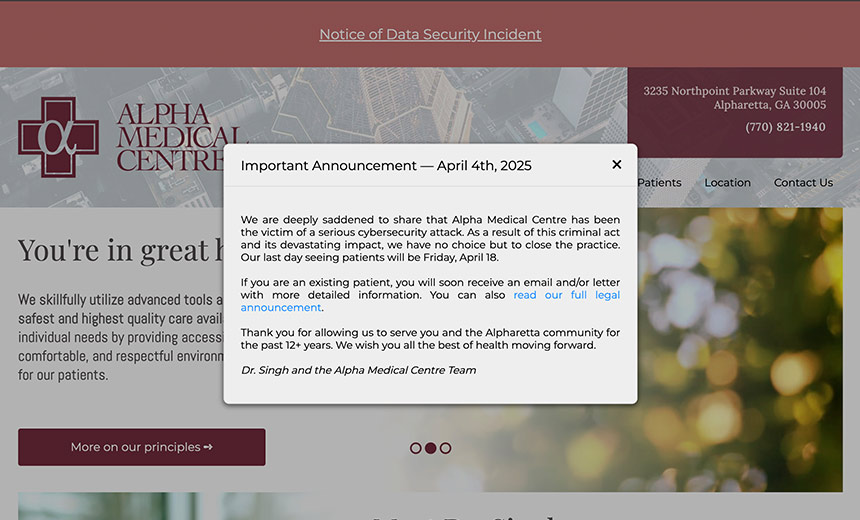Business Continuity Management / Disaster Recovery,
Cryptocurrency Fraud,
Fraud Management & Cybercrime
Alpha Wellness Announces Permanent Closure Following ‘Devastating’ Cyberattack

A small medical provider in Georgia, Ascension Health Services LLC, operating as Alpha Wellness and Alpha Medical Centre, has permanently closed its doors following a significant cyberattack and subsequent data theft. This incident, characterized as “devastating,” has reportedly forced the organization to cease its operations effective April 2025.
The attack was allegedly perpetrated by the cybercriminal group RansomHub, which has publicly claimed Alpha Medical Centre as one of its victims. On July 8, the organization reported a breach to the U.S. Department of Health and Human Services under HIPAA regulations, citing unauthorized access to data affecting approximately 1,714 individuals.
In a public statement posted on its website, Alpha Medical Centre expressed deep sorrow over the attack, clarifying that the severity of the incident left no option but to shut down the practice permanently. Operations came to a halt on April 18.
While the breach affected a modest number of patients compared to larger incidents frequently reported, it highlights ongoing vulnerabilities within smaller healthcare entities facing increasingly sophisticated cybercriminal tactics. According to the MITRE ATT&CK framework, the likely tactics used in this attack include initial access, possibly through phishing or exploiting unpatched vulnerabilities, followed by data exfiltration and impact events associated with ransomware.
Both the medical centre and its affiliated wellness practice, under the leadership of Dr. Rajender Singh, conveyed messages of closure on their respective websites. Despite having no direct link to the larger Ascension health system, Ascension Health Services LLC faced extensive impacts, revealing challenges faced by smaller organizations amid rising cyber threats.
Notably, Alpha Medical Centre joins a growing list of healthcare facilities that have succumbed to cyberattacks in recent years. Recent examples include Pinehurst Radiology, which shut down earlier this year post-attack, demonstrating the profound and lasting financial and operational ramifications of such incursions.
Experts warn that the combination of high recovery costs, inadequate cybersecurity insurance, and operational disruptions significantly burdens small healthcare organizations. They recommend that these entities undertake robust preparedness measures, including investing in effective cybersecurity infrastructure, ensuring comprehensive cyber liability insurance, and actively participating in threat intelligence-sharing initiatives.
Alpha Medical Centre’s experience serves as a sobering reminder for healthcare providers about the critical importance of cybersecurity resilience in an increasingly hostile digital landscape.
